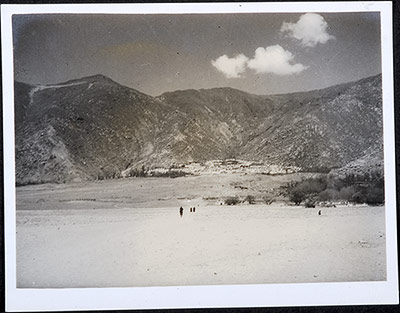
1999.23.1.17.1 (Album Print black & white)


1999.23.1.17.1 (Album Print black & white)

H. Staunton ?
Harry Staunton
1940 - 1941
Lhasa Area > Drepung monastery
1999.23.1.17.1
110 x 87 mm
Print gelatin silver
Donated 1999
Diana Hughes
H. Staunton
Diana Hughes
Notes on album mount - "Drepung" is written in pencil in capital letters below the photograph on the album page. [KC 30/12/2005]
Other Information - Related Images: 1999.23.1.20.3/4
Other Information - Setting: F Spencer Chapman writes about Drepung monastery in Lhasa: The Holy City, 1938, London:Chatto and Windus, p. 195, "In the vicinity of Lhasa the great monasteries of Drepung, Sera and Ganden, known as the Three Pillars of the State, contain some 20,000 monks. ... Drepung is supposed to house 7700 monks, but sometimes as many as 10,000 live there. The name Dre-pung literally means 'the pile of rice', which is what the monastery resembles as its tiers of whitewashed buildings lie one behind the otheron a sloping site at the head of a wedge-shaped valley. Looked at from a distance Drepung resembles a large fortified city rather than a single monastery, and it is only when one climbs the steep mountain slopes behind it and looksdown on to its innumerable ramifications that one gets a true idea of its immense size. Looked at from below it is foreshortened and many of the buildings are dwarfed or hidden."
For Citation use:
The Tibet Album.
"Drepung monastery fom a distance"
05 Dec. 2006. The Pitt Rivers Museum.
<http://tibet.prm.ox.ac.uk/photo_1999.23.1.17.1.html>.
For more information about photographic usage or to order prints, please visit the The Pitt Rivers Museum.
© The Pitt Rivers Museum